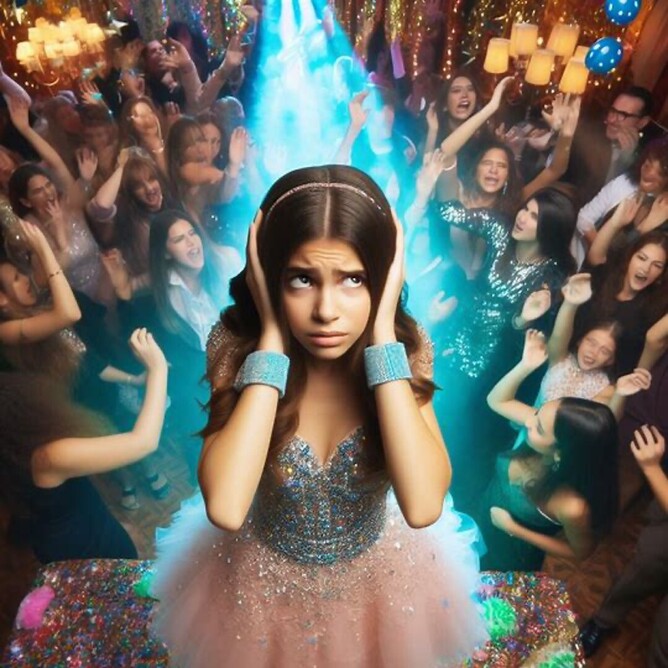"There's just something I need to tell you about my kid..."
That's often one of the first things I hear from parents enquiring about our DJing service for their kids' b'mitzvahs.
And half the time it's an issue to do with their neurodivergency—autism, what people used to think of as Aspergers, ADHD, etc.
One of these parents' main worries is how they'll be able to achieve the same ruach they see at other family simchas whilst accomodating their own or other guests' sensitives to various sensory stimuli like loud music, disco lights, big crowds, and lots going on.
Many have felt excluded from the big fat simcha parties that they see typical families enjoy. And they've told me that deep down they've felt sad because they'll miss out and not be able to share in that experience.
Don't assume
Parents obviously know their own kids better than anyone. And they'll have witnessed meltdowns and withdrawal from activities that overwhelm their kids. Armed with that lived experience, they have a very good idea how their child will react in all sorts of situations including at a simcha party.
I've witnessed it many times, too, both as a guest and as an event planner, DJ, MC. I've seen kids suddenly start sobbing uncontrollable, collapse on the floor, run out of the room, hide under a table, and more! These episodes can last for over an hour. And of course it's distressing for family and friends, too.
What clients of ours and a select few other party professionals have found, though is that experience working with such children has resulted in lots of accomadations that result in the most fulfilling, positively memorable, and affirming gigs ever!
Common and easy accommodations for sensory processing sensitivies
Everyone is different. That's as true for neurodivergent people as it is for neurotypical people. A lot of the research shows that something like a fifth of people may be neurodivergent. And we know from experience that many of them are hypersensitive to certain sounds, lights, environments, foods, and more.
In my experience, what may appear to a general sensitivy to loud music is often alleviated by simply turning down the bass a little, limiting the duration of more intense dance sets, and even regulating the tempo of the music.
I remember several years ago in the final 10 minute climax of the party and the peak of excitement we were all—including a highly sensitive autistic child—moshing to a full on floor filler. It could've been anythinig from Walk the Moon's Shut Up and Dance to Galaxy's Freed From Desire. They're both high energy bangers and about 128 BPM (beats per minute, a measure of speed).
Suddenly, I saw the b'mitzvah kid clap their hads of the ears and stand rigid in the middle of the dance floor.
Now, one of the main competences of top DJs is being able to tune in to the crowd. We connect with you so we follow and lead the vibe of the party. And there's no clearer signal than from someone who doesn't have the same ability as typical people to regulate their responses to stimuli.
Most people are able to tolerate music that makes them uncomfortable and can inconspicuously slink off the dance floor if it gets too much.
However, this kid indicated without hesitation or inhibition that right at that moment the music crossed a line.
That kind of signal is a gift to a tuned-in, experienced DJ. And on that occasion I remember instinvtively and immediately clicking to Sinatra's epic jazz number New York, New York. Still a huge party theme, at less than 100 BPM it's far slower, and being more rythmic it's steadying.
Instant relief and smiles, and the perfect ruach.
And similar examples exist for things like disco lighting.
I've found that moving lights don't seem to be as triggering as flashing lights. Certain colours can work better than others. And even darkening the room can help.
The key is to tune in to the needs of everyone who's there
By not assuming that a big fat party is not going to be possible, it's worth having a DMC with a progressive DJ/MC who'se knowledgeable and experienced partying with sensory processing sensitive people. Share your own lived experiences and see if you can work something out.
It's normal and desirable for everyone to let their limits be pushed a little as it gives us opportunities to grow, and let rip! Neurodivergent b'mitzvah kids deserve this experience, too. And our b'mitzvah families have consisitenyly found that this kind of ruach leaves them with wonderful, life-affirming memories of their precious milestones.
Got an experience you'd like to share?
Whether you've seen it in others or experienced it yourself, why not share your own experiences with sensory overload when the stimuli at a party have become overwhelming...
